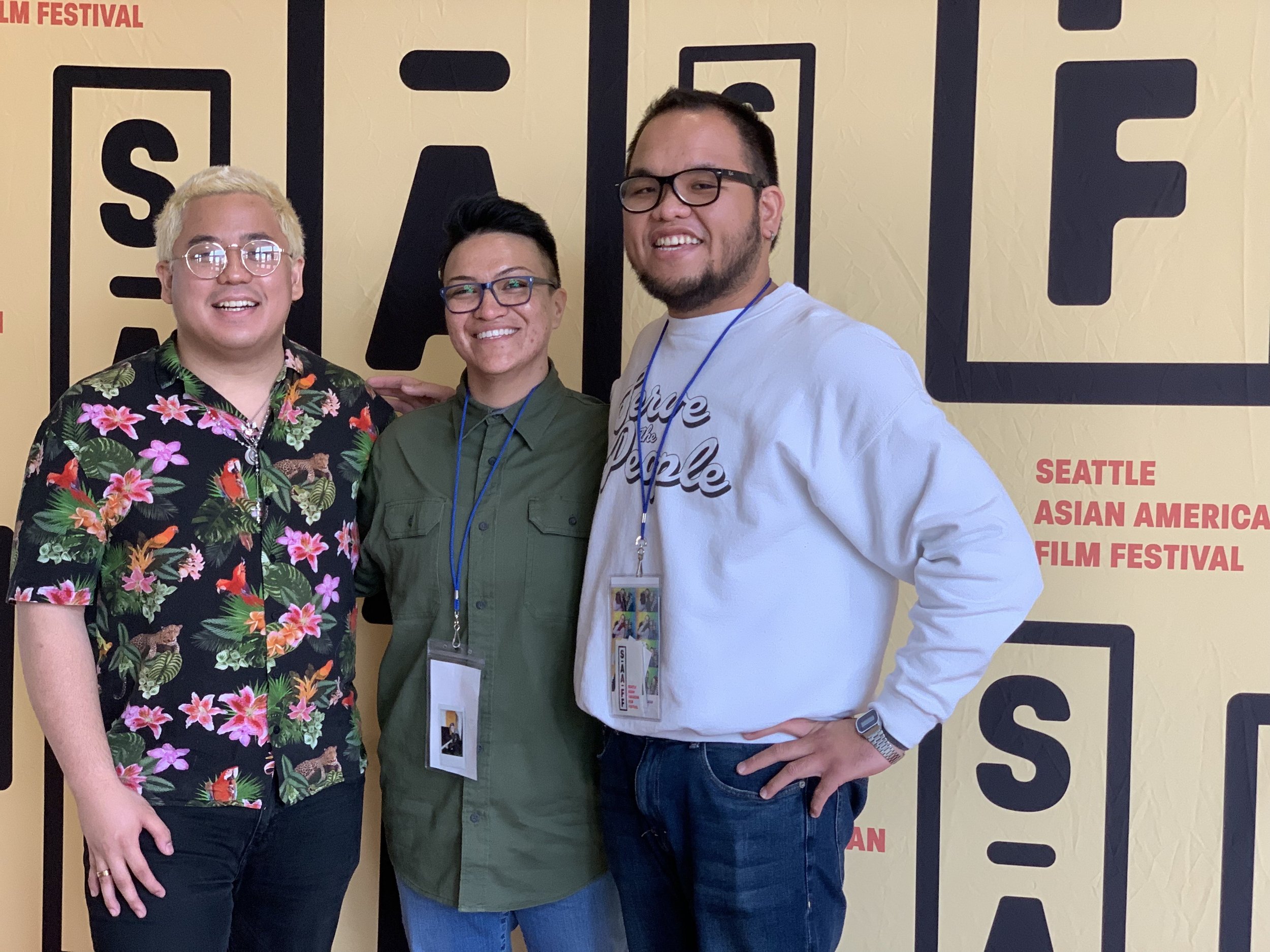Through Our Lens: Filmmakers call for a more inclusive entertainment industry
Set Hernandez Rongkilyo (right) at the Seattle Asian American Film Festival. Courtesy: Set Hernandez Rongkilyo
Editor’s Note: This is the second part of “Through Our Lens,” a series of short stories about filmmakers and media-makers in the entertainment industry. Storytellers in the Through Our Lens series discuss identity, the power of art, and the need for equitable opportunities for immigrants.
Andrea Ayala
Andrea (she/her/hers) is a first-generation documentary impact professional, writer, and filmmaker currently working as an administrative associate for the Color Congress, which aims to center and strengthen non-fiction storytelling by, for, and about people of color across the United States and territories.
“More broadly speaking, hiring in this country is built on who you know and is rooted in connections based on some form of commonality. The entertainment industry in LA is built on this same culture. There is more of a built-in hierarchy where you’re expected to ‘pay your dues’ — take on unpaid labor, work in terrible, sometimes abusive environments, and force yourself to take everything you can get,” Andrea said.
According to Andrea, this culture reinforces a hiring process that keeps individuals with fewer connections at the bottom of the hierarchy from the beginning and results in a lack of representation among actors, actresses, and crew members in the industry.
Paolo Rein
Paolo (he/him) stood before a panel of speakers discussing how to apply for grants and writers’ room internships.
“What would you recommend to someone applying if they are undocumented?” he asked. One representative told Paolo he was ineligible to apply due to his immigration status. “I think as a medium of filmmaking and storytelling, it is disrespectful to the craftsmanship not to include people in your crew who tie in or connect with the story that can offer much more perspective,” Paolo said.
As an artist and filmmaker, Paolo wants to hire and provide mentorship to formerly incarcerated people, undocumented creatives, and LGBTQ+ individuals for future projects.
Pea Núñez
Pea (they/she), who identifies first as a human being, is a nonbinary cinematographer based in Los Angeles. They have freelanced in the entertainment industry for the past five years. Many challenges come with being self-employed, specifically when it comes to working long hours on set, they said.
“Things have been getting worse the past couple of years when it comes to people behind the camera. It is still very much a white industry,” Pea said. “Set etiquette in general needs to be reformed.”
Pea found community and more opportunities with production companies led by queer people of color.
“A lot of the work I end up doing is with queer producers and directors. In my experience, queer people of color have been some of the best heads of the departments because they respect your time, value your work, and see how worthy it is for you to be there with them,” they said.
Set Hernandez Rongkilyo
“Gatekeeping culture is real,” said Set, a filmmaker whose roots come from Bicol, Philippines. “People don’t want to work with you because they’re afraid of what it might mean for them legally.”
As a queer, undocumented immigrant, Set (they/ them/she/her) highlights the force behind community organizing. They emphasize the need for more spaces where filmmakers of color can exchange ideas and resources and build long-lasting connections.
“The power of organizing is where we can come together and not just physicalize our issues, but also really work together to make demands because we have collective power,” Set said.
Spaces like Firelight Media and the Asian American Documentary Network helped Set navigate their filmmaking journey. They wrote and directed “Cover/ Age,” a 2020 short film that examines the lack of healthcare access for undocumented immigrants in California and how two undocumented individuals are advocating to fight this exclusion. Set also served as an impact producer for “Call Her Ganda,” a non-fiction documentary about Jennifer Laude, a Filipina trans woman who was brutally murdered by a U.S. Marine in 2014.
A portrait of Nicole Solis-Sison. Photo: Lorillee Paras
Nicole Solis-Sison
Filmmaker Nicole Solis-Sison (she/her) calls for inclusionary pathways in the entertainment industry, which she says tends to operate under a lens of competition rather than elevation.
“Let’s think about hiring undocumented creatives. You can do that in multiple ways, but what path do you choose to take? There is the exclusionary path where you ask everyone for their Social Security Numbers when hiring. No one is asking you to do that. You are choosing to do that. Or you can take the inclusionary pathway of asking people for an ITIN. That’s not breaking any rules. So the criminalization of our identities is always a choice by the gatekeeper,” Nicole said.
An Individual Taxpayer Identification Number (ITIN) is a tax processing number issued by the Internal Revenue Service that individuals who are not eligible for an SSN can use to pay federal taxes regardless of their immigration status.
Nicole is one of the co-producers and impact strategists for the film “Undocumented Justice,” which follows Luis Curtis Romero, the first undocumented attorney to challenge a case at the Supreme Court. Luis joined a team of lawyers to sue the Trump Administration for rescinding the Deferred Action for Childhood Arrivals (DACA) program, arguing that the 2018 executive order was unlawful.
“This film is much more than just policy. It’s much more than just fighting for our rights to be here. It’s the first time I’ve ever seen and felt empowered by our identities,” Nicole said. “Reclaiming that narrative shows we are successful, beautiful human beings.”


